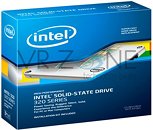Monday, March 21st 2011

Intel 320 Series SSD with 25 nm NAND Flash Slated for 28 March, Priced
Intel's 320 series solid-state drives (SSDs) are on track for a March 28 launch. The silicon giant is on a bit of a spree with its SSD product launches over the past few weeks. Intel 320 series, also referred to as "Postville Refresh", succeeds the company's X25-V and X25-M series, consisting of SATA 3 Gb/s SSDs in the 2.5-inch form-factor. The drives achieve sequential read speeds of 250 MB/s, and write speeds of 170 MB/s; Up to 39,500 IOPS random 4 KB reads, and up to 23,000 IOPS random 4 KB writes.
The only major change here is the multi-level cell (MLC) NAND flash chips used inside, which are built on Intel's new 25 nm manufacturing process. Other new features include 128-bit AES data encryption, enhanced power-loss management, and up to 1.2 million hours MTBF. 320 series is available in 40 GB (US $109), 80 GB ($189), 120 GB ($239), 160 GB ($329), 300 GB ($569), and 600 GB ($1,119). With the 320 Series, Intel intends to target the business/office and mainstream markets, propagating SSDs to key high-volume segments.
Source:
VR-Zone
The only major change here is the multi-level cell (MLC) NAND flash chips used inside, which are built on Intel's new 25 nm manufacturing process. Other new features include 128-bit AES data encryption, enhanced power-loss management, and up to 1.2 million hours MTBF. 320 series is available in 40 GB (US $109), 80 GB ($189), 120 GB ($239), 160 GB ($329), 300 GB ($569), and 600 GB ($1,119). With the 320 Series, Intel intends to target the business/office and mainstream markets, propagating SSDs to key high-volume segments.

13 Comments on Intel 320 Series SSD with 25 nm NAND Flash Slated for 28 March, Priced
280 MB/s read and 270 MB/s write
215$ for 115 gb and 169$ for 80 gb
I wonder what's the differemce... power consumption or reliability?
Here's the link to Expreview's test:
translate.google.com/translate?js=n&prev=_t&hl=en&ie=UTF-8&layout=2&eotf=1&sl=zh-CN&tl=en&u=http%3A%2F%2Fwww.expreview.com%2F14414.html
Accoring to the test results, the intel G3 ssd doesn't bring any significant performance boost comparing to the former G2 version. The controller of the G3's remains the same as the G2's, except it goes 25nm whereas the original G2's controller is based on 34nm technology.
btw, you know there has been a new firmware this year for the G2 this year ?.. Lazzer408 posted on here some time ago of a performance increase too.
www.techpowerup.com/forums/showthread.php?p=2232059#post2232059
www.anandtech.com/show/4244/intel-ssd-320-review
"Apparently the G2 controller had a number of features on-die, but not implemented in firmware. Things like full disk encryption and NAND redundancy never made it out in G2 but are here in the 320 all thanks to new firmware. And no, G2 owners aren't getting it."
Oh, and the failure rate per year went up by 50% (from 0.4% to 0.6%) but obviously Intel is learning from apple and applying their distortion field "it's the same".
"Idle power is a little higher than the X25-M G2 but both of our load tests show lower power usage than Intel's 2nd generation drive." except most computers spend most of their time idle, and in a laptop to have 3x more idle AND load power than the competition is a disgrace, let alone from Intel. The only good thing power-wise going for this is random writes at high queue depth.
And I have a problem with those specific results since all memory channels are saturated and the benefit of larger page size is huge. For anything less than 160Gb there will be a lot of disappointment.
Too late, too slow and too expensive (and not as reliable). Mainstream my a#$.